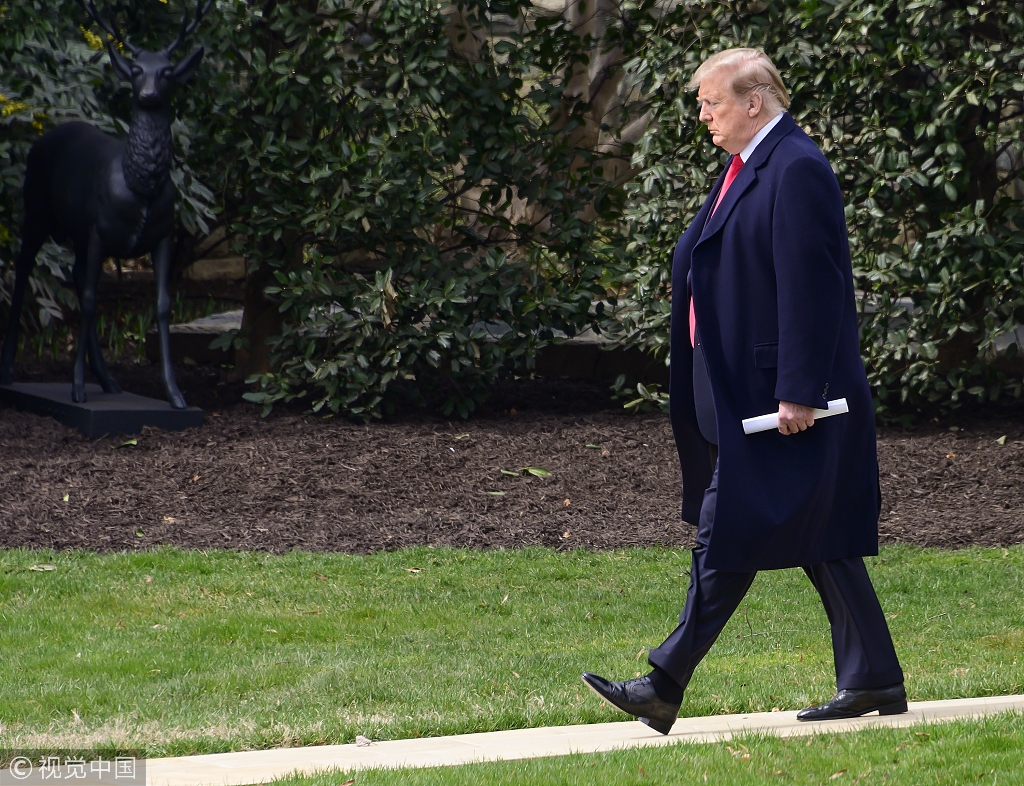
United States President Donald Trump walks from the Oval Office, file photo. [Photo/VCG]
Editor's Note: With Russian troops arriving in Venezuela on March 24, the allegations of foreign interference in Venezuela have intensified between Moscow, which supports Venezuelan President Nicolas Maduro, and Washington, which backs self-proclaimed interim Venezuelan president Juan Guaido. Given the recent political developments, what does the future hold for Venezuela? Two experts share their views on the issue with China Daily's Pan Yixuan. Excerpts follow:
Maduro faces severe economic problems
Yang Jianmin, a researcher at the Institute of Latin America, Chinese Academy of Social Sciences
Venezuela started exploring an alternative-non-Western-development model under former president Hugo Chavez. But after the sudden death of Chavez in 2013, Venezuela's economic growth started slowing.
Venezuela's economy has suffered, especially because of the drastic fall in the price of oil, the country's prime exports. The ill effects of the Venezuelan economy's overreliance on oil were evident in rising inflation and people's frustration over corruption even toward the end of Chavez's presidency.
The remarkable drop in oil prices after Maduro took office aggravated Venezuela's economic problems leading to political and social instability. In recent days, many parts of Venezuela have suffered power outages and a lack of potable water. On Sunday, some Venezuelans even torched barricades to protest against the shortage of power and water.
Besides, by experimenting with "Bolivarian socialism", Chavez created opponents in the Western world, mainly in the United States. In recent times, even some Latin American countries, Brazil and Argentina in particular which have voted rightist governments to power, have turned against Maduro.
Venezuela's opposition leader Guaido has rallied the support of some Venezuelans and foreign countries to condemn Maduro.
Still, the critical developments in Venezuela and the US-Russia blame game over "military interference" in the country are not likely to lead to a conflict between Washington and Moscow. While Russia may not want to confront the US in a South American country for strategic reasons, the US knows a conflict with Russia will not serve its purpose. And although some Latin American countries now seek closer ties with the US, they don't want a war.
Without growth, Venezuela's economy will continue to weaken. And given the external environment, it is very difficult for Maduro to put Venezuela back on the track of economic development, perhaps because he lacks the charisma of Chavez to unify the people.
Little impact of crisis on Latin America
Zhu Feng, executive director of the Collaborative Innovation Center of South China Sea Studies and dean of the Institute of International Relations of Nanjing University
The US was opposed to Chavez for leading Venezuela on a development path different from the Western model and helping unite Latin American countries against the US. But the US did not take any drastic action against Venezuela as it believed Caracas didn't pose a real threat to American interests.
But the rise of right-wing leaders in some Latin American countries and the rising inflation in Venezuela changed all that. Seizing the opportunity, the US began backing Venezuelan opposition leader Guaido against Maduro.
Still, the US is not likely to directly intervene in Venezuela. And the presence of Russian troops, which Moscow claims is part of an existing agreement of technical military cooperation with Caracas, is to flex some strategic muscles rather to start a conflict.
Although Venezuela has huge oil reserves, its economic experiments have not been successful. As a result, it is facing severe internal and external problems. The only way Venezuela can emerge out of the internal and external crises is by boosting its economy, which unfortunately has worsened because of US sanctions. There can be three possible outcomes for the Maduro administration: it may succumb to the US-led external pressure to make a deal with Washington, overcome the opposition led by Guaido which doesn't seem likely, or be ousted from office by a coup.
But the Venezuelan crisis will have little impact on Latin America because the chances of a US-Russia military confrontation is remote and Venezuela's unsuccessful economic experiments will prevent other Latin American countries, some of which now have right-wing governments, from following in Venezuela's footsteps.
The views don't necessarily represent those of China Military Online.













